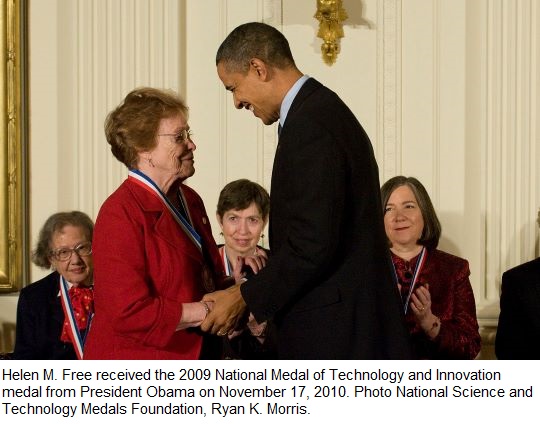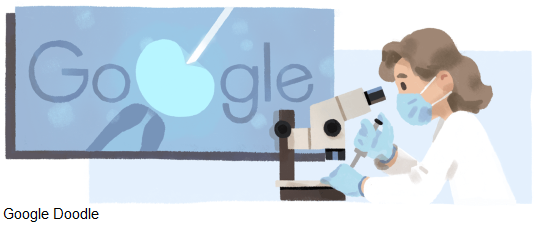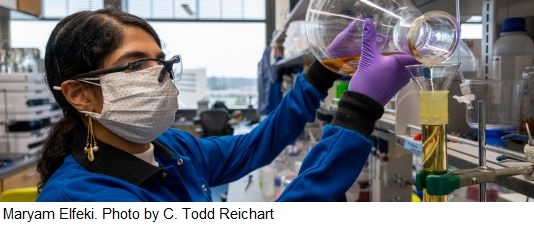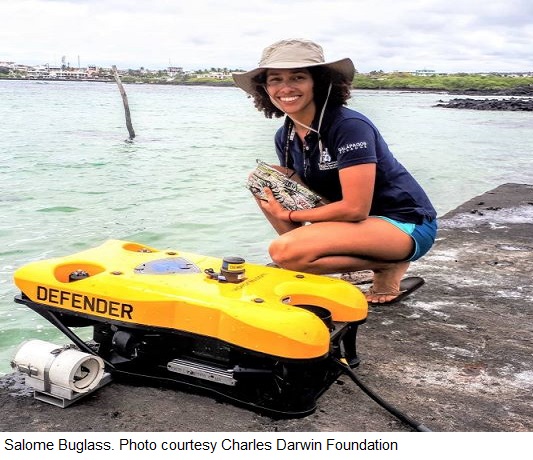RFS Briefings - May 18, 2021
Dear Colleagues,
I am pleased to include another issue of RFS Briefings with some timely and encouraging updates on women in science.
A few highlights to focus on here include upcoming events and awards:
-
The Foundation for the Institutes of Health announced the launch of the Deeda Blair Research Initiative for Disorders of the Brain to drive innovation in mental health research. Mrs. Blair was an initial and ongoing supporter and Board Member of RFS. Read more.
-
Congratulations to Christine Petit and Christopher A. Walsh, recipients of the 2021 Gruber Neuroscience Prize, for their groundbreaking work on the genetic and molecular mechanisms behind the development of inherited neurodevelopmental disorders. Read more.
-
Nominations for the 2021 John Maddox Prize are open until June 14. The John Maddox Prize recognizes the work of an individual to promote sound science and evidence on a matter of public interest, facing difficulty or hostility in doing so. Read more.
-
The National Academy of Sciences announced the election of 120 members — 59 of whom are women, the most elected in a single year — and 30 international members in recognition of their distinguished and continuing achievements in original research. Read more.
See below for more news about women in science
Please continue to share important news and opportunities with us so that we may share it with you, and others who are committed to supporting the careers of exceptional women in science.
Stay safe and sound,

Karla Shepard Rubinger
Executive Director
Rosalind Franklin Society
www.rosalindfranklinsociety.org
Helen Murray Free, chemist who revolutionized diabetes testing, dies at 98
Helen Murray Free, the recipient of a 2009 National Medal of Technology and Innovation honoring her “seminal contributions to diagnostic chemistry,” died May 1 at a hospice facility in Elkhart, Ind. She was 98. The cause was complications from a stroke, said her son Eric Free. Read more.

Nominations for the 2021 John Maddox Prize are open until 14 June.
The John Maddox Prize, now in its tenth year, is a joint initiative of Sense about Science and Nature. It recognizes the work of an individual to promote sound science and evidence on a matter of public interest, facing difficulty or hostility in doing so. Its premise is the value of an open and honest environment for society to discuss scientific evidence. They welcome nominations from individuals across disciplines, countries, and continents. The Maddox prize can be won by individuals at all stages in their careers, however there is a further prize for an individual at an early career stage. Read more.
They call it a ‘women’s disease.’ She wants to redefine it.
Linda G. Griffith is a professor of biological and mechanical engineering at M.I.T., and its director of the Center for Gynepathology Research. Dr. Griffith founded the lab in 2009 with the goal of helping researchers solve endometriosis, a chronic disorder in which tissue similar to that which normally lines the uterus instead grows outside it, according to an article on The New York Times. The disease strikes one in 10 women, as well as trans men and nonbinary people who menstruate. Its hallmarks are extreme pain and, in some cases, infertility. Read more.
Three Scripps Research faculty members honored with endowed chairs.
In recognition of their scientific leadership and breakthroughs that have opened new possibilities for treating disease, Scripps Research professors Donna Blackmond, PhD, Marisa Roberto, PhD, and Xiang-Lei Yang, PhD, have been honored with endowed chairs. “These respected scientists embody the research excellence Scripps Research is known for,” says Peter Schultz, PhD, president and CEO of Scripps Research. “Their laboratories continue to inspire new ways of solving serious challenges in health and medicine.” Read more.
National Academy of Sciences elects new members — including a record number of women — and international members.
“The historic number of women elected this year reflects the critical contributions that they are making in many fields of science, as well as a concerted effort by our Academy to recognize those contributions and the essential value of increasing diversity in our ranks,” said National Academy of Sciences President Marcia McNutt. “I am pleased to welcome all of our new members, and I look forward to engaging with them in the work of the National Academies.” Read more.
Google Doodle celebrates biologist Anne McLaren, IVF pioneer.
On Monday, April 26, 2021, Google Doodle marked the 94th birthday of scientist Anne McLaren, whose work in the 1950s laid the foundation for in vitro fertilization technology. Using mice as research subjects, she showed it was possible to grow healthy embryos outside the womb. In 1991, she became the first woman to hold office in the Royal Society, and in 1994 she was elected president of the British Association for the Advancement of Science. She died in 2007, aged 80. Read more.

Cryptyx Bio's drug discovery platform: Elegant approach meets entrepreneurial spirit.
Maryam Elfeki, a postdoc in the Seyedsayamdost Lab at the University of Illinois at Chicago, is helping to bring High Throughput Elicitor Screening (HiTES) to the drug discovery field. HiTES provides a means to activate “silent” natural product biosynthetic genes in bacteria, which can aid in the development of new medicines. Read more.

'Raven the Science Maven' encourages students to find their voice in STEM.
Raven Baxter was recently named to Fortune magazine’s 40 under 40 list of global influencers, in part for creating a series of viral music videos on topics ranging from female empowerment in science to COVID-19 safety. Baxter said the videos are meant to inspire a new generation of scientists while explaining science in an engaging and informative way. Read more.
Galapagos explorer Salome Buglass opens door for black women in marine science.
Often the only person of color in her classes and research work, marine ecologist Salome Buglass is advocating for the field of marine ecology to be more accessible to people from minority groups. Last year, Buglass teamed up with over 200 other black marine scientists to form the Black Women in Ecology, Evolution and Marine Sciences (BWEEMS) awareness group. Read more.

Joanne Chory is using plants to save the planet.
Joanne Chory strives to fight climate change by optimizing plants' abilities to capture carbon dioxide. She won the most prestigious honor in her field, the Breakthrough Foundation’s life sciences prize, which came with a $3 million check. Chory also established her own lab at the Salk Institute and was elected to the National Academy of Sciences. Her work was recently profiled in the "Climate Visionaries" series by The Washington Post. Read more.
“#IfThenSheCan – The Exhibit” featuring more than 120 female STEM ambassadors from across the country debuts at NorthPark Center in Dallas on May 15
#IfThenSheCan – The Exhibit celebrates the contributions of more than 120 AAAS IF/THEN® Ambassadors, contemporary female STEM professionals and role models from a variety of industries including entertainment, fashion, sports, business, and academia. This life-sized statue exhibit will be free to the public and debuts at Dallas’ NorthPark Center on May 15, 2021 running through October 2021. Read more.
‘Picture a Scientist’ director Sharon Shattuck wants you to know you’re not alone.
The 2020 documentary Picture a Scientist, co-directed by Ian Cheney and Sharon Shattuck tells the stories of biologist Nancy Hopkins, chemist Raychelle Burks, and geologist Jane Willenbring, three female scientists who’ve endured a form of abuse that is far more common in science than most care to admit. Picture a Scientist is now streaming on PBS, and will soon be available on Netflix. Read more.
Physical chemist Geraldine Richmond tapped to head US DOE science programs.
Award-winning chemist Geraldine Richmond is President Joe Biden’s choice to captain the US Department of Energy’s science programs. Biden is also nominating biogeochemist Asmeret Asefaw Berhe to direct the agency’s Office of Science. Read more.
Sarah Evanega: Using science communication to combat misperceptions.
As founder and director of the Cornell Alliance for Science, Sarah Evanega faces down misperceptions, myths and misinformation about agricultural biotechnology. Now she’s also taking on the conspiracy theories and disinformation campaigns that swirl around the pandemic, vaccines, climate change and synthetic biology. Read more.
Discrimination is still a problem in STEM.
This year’s New Scientist Jobs STEM Industry Survey raises several key themes of concern to the STEM workforce, and suggests how employers can best tackle these problems to make workplaces as inclusive as possible. The survey reveals that, in terms of discrimination and harassment, there is still a long way to go in guaranteeing employee happiness and security. Read more.
How to break down the barriers young women still face in STEM.
A survey by U.K. education provider QA published in 2019 found that more than half of young women would be interested in a career in STEM but 78% were discouraged by gender inequality. How do we open the doors for more young women to enter the world of STEM? Dr Anne-Marie Imafidon, founder of STEMettes, shares her insights. Read more.
Marianna Limas, Social Media Manager
Nilda Rivera, Partnership and Events Manager
|




